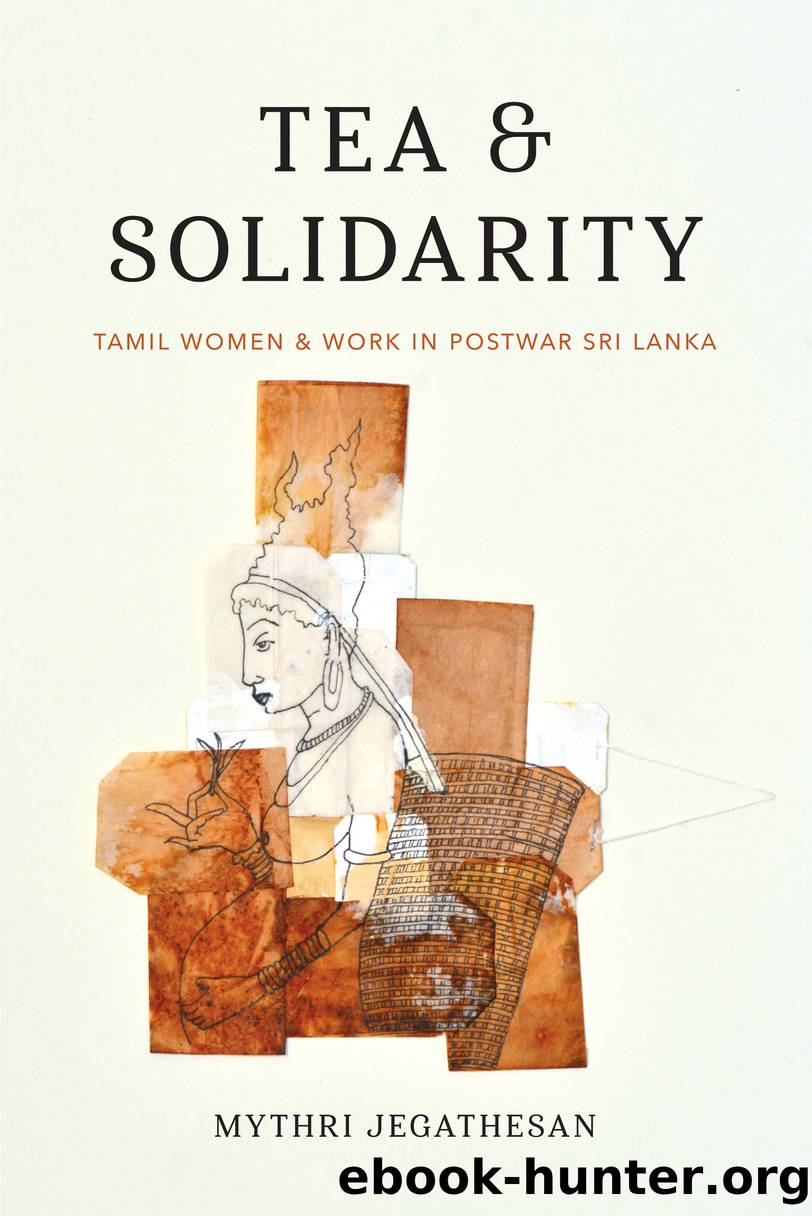Tea and Solidarity by Jegathesan Mythri;

Author:Jegathesan, Mythri;
Language: eng
Format: epub
Publisher: University of Washington Press
CHAPTER 6
Dignity and Shame
In August 2009 the bodies of two young girls from a plantation were found dead face down in Torrington Canal on Bauddaloka Mawatha Road in Colombo. Next to the bank of the shallow canal were two sets of rubber thong sandals facing the waterâs edge. Sinhala, Tamil, and English news outlets reported that both girls, Sumathi and Jeevarani, had been employed as domestics in two adjacent households located near the junction since April 2009. Initial investigations ruled the deaths a double suicide.
The location and presentation of their bodies were jarring. The section of Torrington Canal where they were found was in a High Security Zone (HSZ) in Cinnamon Gardens, an affluent and elite suburb of Colomboâs city center. Once known for its sprawling cinnamon plantations during British colonial rule, the suburb at the time was and still is home to prime real estate, fancy clubs, and maximum-security government offices. In a capital accustomed to military checkpoints, unannounced cordon and searches, and suicide (and even aerial) bombings during the civil war, how two Tamil youth had drowned themselves in less than three feet of sewage and trash in a High Security Zone on a prominent, high-traffic road was suspect to say the least.
News of the girlsâ deaths quickly traveled through the Hill Country by word of mouth, newspapers, and the evening news. Rumors were flying about what had happened, and English-based newspaper reports were biased, misleading, and often hugely inaccurate. In the first week following the discovery of their bodies, reports stated that the girls were eighteen and seventeen and that they had definitely committed suicide. Days later, the media reported that their ages were sixteen and fifteen. The girlsâ grieving parents, who were living on the same estate, were able to produce their birth certificates to confirm that their daughters were even younger: Sumathi was thirteen years old, and Jeevarani was fourteen. Their statement confirmed what Tamil politicians, development workers, and community leaders in the plantation sector had feared mostâthey were children, and they had been unlawfully employed as domestics to support their families back on the plantation.
Media and law enforcement investigating the case further fueled the sensationalism in their reporting. Media outlets appeared to have been given access to the crime scene, including the now-defunct human rights reporting website War without Witness in Sri Lanka, which showed images of the clothed backsides of both girlsâ corpses floating in the sewage- and trash-filled canal water. On August 28, 2009, one of Sri Lankaâs largest English print newspapers, the Daily Mirror, published a two-page spread on the story in which the details of the case were further explicated. In the feature article, the officer in charge confirmed that there was no evidence supporting the possibility of foul play. He justified his statement with claims that evidence suggested that Sumathi and Jeevarani had in fact committed suicide, and he was quoted on the record in the following statement: âThere is evidence that points to suicide. There was a letter, which had indicated homosexual behaviour.
Download
This site does not store any files on its server. We only index and link to content provided by other sites. Please contact the content providers to delete copyright contents if any and email us, we'll remove relevant links or contents immediately.
International Integration of the Brazilian Economy by Elias C. Grivoyannis(75004)
The Radium Girls by Kate Moore(11621)
Turbulence by E. J. Noyes(7702)
Nudge - Improving Decisions about Health, Wealth, and Happiness by Thaler Sunstein(7244)
The Black Swan by Nassim Nicholas Taleb(6770)
Rich Dad Poor Dad by Robert T. Kiyosaki(6179)
Pioneering Portfolio Management by David F. Swensen(6081)
Man-made Catastrophes and Risk Information Concealment by Dmitry Chernov & Didier Sornette(5650)
Zero to One by Peter Thiel(5494)
Secrecy World by Jake Bernstein(4389)
Millionaire: The Philanderer, Gambler, and Duelist Who Invented Modern Finance by Janet Gleeson(4099)
The Age of Surveillance Capitalism by Shoshana Zuboff(3989)
Skin in the Game by Nassim Nicholas Taleb(3968)
The Money Culture by Michael Lewis(3849)
Bullshit Jobs by David Graeber(3833)
Skin in the Game: Hidden Asymmetries in Daily Life by Nassim Nicholas Taleb(3724)
The Dhandho Investor by Mohnish Pabrai(3561)
The Wisdom of Finance by Mihir Desai(3526)
Blockchain Basics by Daniel Drescher(3330)
